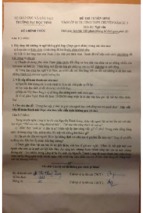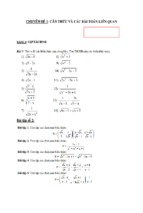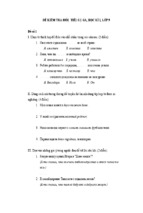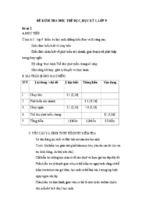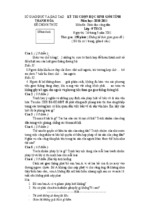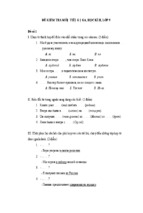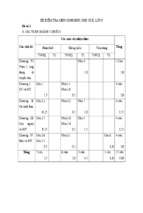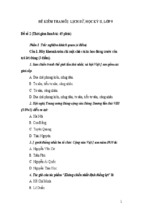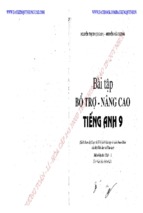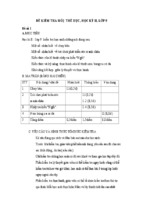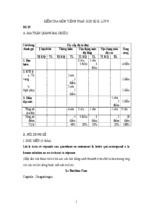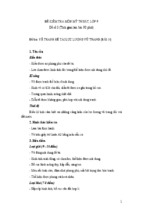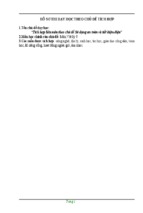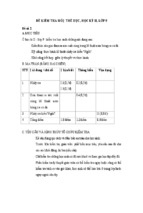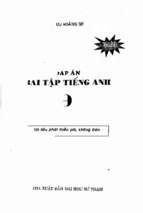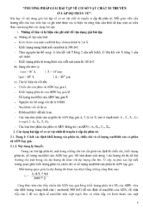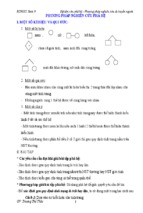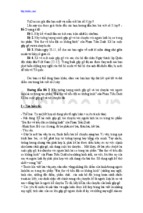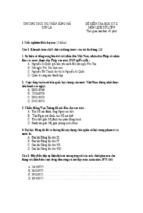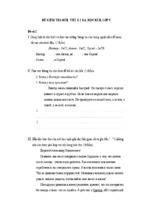File word Lí thuyết và bài tập tiếng anh lớp 9 cả năm có đáp án
Lí thuyết và bài tập tiếng anh lớp 9 cả năm có đáp án File word cho giáo viên dạy tiếng anh lớp 9
Lí thuyết và bài tập tiếng anh lớp 9 cả năm có đáp án File word cho học sinh học lớp 9 và ôn thi vào lớp 10
MỤC LỤC
PHẦN THỨ I: Tóm tắt lí thuyết và bài tập áp dụng theo từng chủ đề
PHẦN THỨ II: Đáp án cụ thể phần bài tập áp dụng theo chủ đề
STT
NỘI DUNG
TRANG
1
Pronunciation
2
2
Chủ đề 1:
A visit from a pen pal
3
3
Chủ đề 2:
Clothing
8
4
Chủ đề 3:
A trip to the countryside
15
5
Chủ đề 4:
Learning a foreign language
20
6
Chủ đề 5:
The media
26
7
Chủ đề 6:
The environment
32
8
Chủ đề 7:
Saving energy
37
9
Chủ đề 8:
Celebrations
40
10
Chủ đề 9:
Natural isasters
45
11
Chủ đề 10: Life on other planets
48
12
Phụ lục 1: cách thêm hậu tố”-ed/-s/-es/-ing/-ly”
51
13
Phụ lục 2: động từ bất quy tắc
52
Lí thuyết và bài tập tiếng Anh lớp 9 cả năm có đáp án
-1-
PHẦN THỨ I
PRONUNCIATION
1. Pronunciation
1.1. Cách đọc đuôi “-ed”. Gồm 3 cách đọc:
+ đọc là /id/ Khi đứng sau /t, d/.
Eg: ……………………...………….
+ đọc là /t/ khi đứng sau /ss, ch, x, sh, k, p, ph,f/.
Eg: …………………………………
+ đọc là /d/ khi đứng sau : trường hợp còn lại. Eg: ………………………….……...
Chú ý:
-ce = /s/
Eg: practiced;
-gh = /f/ ở các từ (enough, rough, cough, laugh)
- se = /z/ thuộc trường hợp còn lại
1.2. cách đọc đuôi “s” Gồm 3 cách đọc:
+ đọc là /iz/ Khi “es”đứng sau /ss, ch, x, sh, ge/.
Eg: ………………………….
+ đọc là /s/ khi đứng sau /t, th, k, p, ph, f/.
Eg: ……………………….…
+ đọc là /z/ khi đứng sau: các trường hợp còn lại.
Eg: ………………..
Chú ý:
-ce = /s/
Eg: practices;
-ic = /ik/
Eg: economics
-gh = /f/ ở các từ (enough, rough, cough, laugh)
-e -> không đọc mà căn cứ vào phụ âm trước nó. Eg: hopes
1.3. Một số âm câm /h/ xuất hiện ở các từ phổ biến sau.
(hour; honest, honesty, honor, exhausted, vehicle)
1.4. một số một số từ có chữ “ch” được phát âm là /k/: (school, Christmas, character,
chemistry, scholar, -ache, scheme, mechanic, chorus)
PRACTICE TEST
1. A. comprised
2. A. divided
3. A. failed
4. A. invited
5. A. removed
6. A. looked
7. A. wanted
8. A. laughed
9. A. believed
10. A. lifted
11. A. schools
12. A. knives
13. A. buses
14. A. garages
15. A. ships
16. A. beliefs
17. A. books
18. A. houses
B. corresponded
B. impressed
B. reached
B. attended
B. washed
B. laughed
B. parked
B. passed
B. prepared
B. lasted
B. yards
B. trees
B. horses
B. boats
B. roads
B. cups
B. days
B. knives
C. depended
C. noticed
C. absorbed
C. celebrated
C. hoped
C. moved
C. stopped
C. suggested
C. involved
C. happened
C. labs
C. classes
C. causes
C. bikes
C. streets
C. plates
C. songs
C. clauses
Lí thuyết và bài tập tiếng Anh lớp 9 cả năm có đáp án
D. separated
D. placed
D. solved
D. displayed
D. missed
D. stepped
D. watched
D. placed
D. liked
D. decided
D. seats
D. agrees
D. ties
D. roofs
D. speaks
D. apples
D. erasers
D. changes
-2-
19. A. roofs
20. A. hats
21. A. heavy
22. A. honor
23. A. honest
24. A. chopstick
25. A. watch
26. A. chemistry
27. A. exchange
B. banks
B. tables
B. honor
B. hour
B. horse
B. choose
B. mechanic
B. kitchen
B. chance
C. hills
C. tests
C. house
C. honest
C. hour
C. scheme
C. children
C. watch
C. reach
D. bats
D. desks
D. heat
D. hope
D. vehicle
D. champion
D. channel
D. champion
D. toothache
--- The end ---
TOPIC 1: A VISIT FROM A PEN PAL
A/ Grammar:
1. The past simple tense (Thì quá khứ đơn): Ghi chú: S = Subject: chủ ngữ
* Form:
Hình thức
To be
Động từ thường
Khẳng định S + am/ is/ are
I/ We/ You/ They/ Số nhiều + Vo + .....
Affirmative
It/ He/ She/ Số ít + V-s/-es + .....
Phủ định
S + am/ is/ are + not + ...
I/ We/ You/ They/ Số nhiều + do not + Vo
Negative
+ .....
It/ He/ She/ Số ít + does not + Vo + .....
Nghi vấn
Am/ Is/ Are + S + .....?
Do + I/ We/ You/ They/ Số nhiều + Vo
Interogative
+ .....?
Does + It/ He/ She/ Số ít + Vo + .....?
* Cách dùng:
- diễn tả hành động đã xảy ra và kết thúc trong quá khứ.
Ex: Maryam đã đến thăm Hà Nội tuần trước.
..............................................................................................................
- Một thói quen trong quá khứ.
Ex: Chúng mình thường trao đổi qua thư mỗi tháng một lần năm ngoái.
..................................................................................................................................
- Một chuỗi hành động trong quá khứ
Ex: Lan đã ra tận sân bay để đón Maryam sau đó họ bắt taxi để trở về nhà Lan.
- ...........................................................................................................................................
* Dấu hiệu nhận biết:
Trong câu thường có các từ: yesterday; last night/ week/ …; in + t-gian q-khứ; khoảng tgian +
ago.
2. Câu diễn tả điều ước với “wish”
a/ điều ước loại 1: S1 + wish(-es) + S + would/ could + V0 + ........
- diễn tả điều hy vọng, mong muốn đạt được trong tương lai
Eg: Mình ước gì một ngày nào đó mình có thể nói Tiếng Anh một cách thành thạo.
- ...........................................................................................................................................
b/ điều ước loại 2: S1 + wish(-es) + S + V (quá khứ đơn) + .........
- diễn tả điều ước trái ngược với sự thật ở hiện tại.
Lí thuyết và bài tập tiếng Anh lớp 9 cả năm có đáp án
-3-
Eg: Mình ước gì mình không phải phụ thuộc vào gia đình.
- ...........................................................................................................................................
Lưu ý: Động từ “to be” được chia là “were” cho tất cả các chủ ngữ ở câu điều ước loại 2.
Eg: Cậu ấy ước gì cậu ấy là một học sinh giỏi.
...........................................................................................................................................
c/ điểu ước loại 3: S1 + wish(-s/-es) + S2 + had + V-ed/V3 + ….
Eg: Ước gì hôm qua mình gặp được Maryam.
- …………………………………………………………………………………….
chúng ta có thể thay wish bằng would rather/ If only: giá mà
Vd: I’d rather my vacation was longer (giá mà kỳ nghỉ của tôi được lâu hơn)
* Complete this table about “wish”.
Lưu ý: đây là cách nhận dạng khi viết lại câu điều ước.
Eg: I am not good at English (sự thật)
I wish I were good at English (điều ước)
Một số trường hợp có thể dùng từ trái nghĩa
Eg: He is short
He wishes he were tall
Fact (sự thật)
Wish (điều ước)
am/ is/ are
weren’t
am not/ isn’t/ aren’t
were
V (-s/es)
didn’t + V0
don’t/ doesn’t + V0
V-ed/ V2
V-ed/V2
hadn’t V-ed/V3
didn’t V0
had + V-ed/ V3
can/ will/ .....
couldn’t/ wouldn’t/ ...
can’t/ won’t = will not/ ...
could/ would/ ...
have/has/had + V-ed/V3
hadn’t + V-ed/V3
haven’t/hasn’t/hadn’t + V-ed/V3
had + V-ed/V3
PRACTICE EXERCISES
I. Use the Past form of the verbs
1. Yesterday, Lan (receive)________________ a letter from Maryam.
2. When we (arrive) _______________ at the mosque, the place (be) ________________ full.
3. I (not visit) __________________ the Temple of Literature last Sunday.
4. …………. She (have) _______________ a long vacation in Kuala Lumpur last year?
5. When ………. you (return) ____________ home last night? - I (return) ____________
home at 9 pm.
6. Yesterday, I (meet) ___________ my old friend and we (talk) ____________ about famous
places in the world.
7. We …………………….. (not want) to go to the cinema last night because of the rain.
8. Why ________ you ……………… (return) the books to the library before the due date?
Lí thuyết và bài tập tiếng Anh lớp 9 cả năm có đáp án
-4-
9. Last summer I _____________ Ngoc Son Temple in Ha Noi. (visit)
10. My parents ______________ very tired after the trip. (be)
11. Trung __________________ a lot of photos during the trip. (take)
12. They _______________ me to every one at the party and they look friendly. (introduce)
13. Paul _________________ to Liverpool yesterday. (return)
14. We _________________ the food was delicious.(think)
14. We (drive) ______________ around the parking lot for 20 mins to find a parking space.
15. Jane ……………….. (mention) my email last night because of her computer breakdown.
II. Give the correct form of the verbs
1. I wish he (be) ………………………. here now.
2. She wishes you (feel) …………………………. better.
3. I wish that you (be) …………………………. here yesterday.
4. I wish he (finish) …………..……………. his work tonight.
5. They wish we (wait)……………………………. for them.
6. I wish you (write) …………………………. to me.
7. I wish you (leave) ……………………….…. earlier yesterday.
8. We wish they (come) ………………………. with us last weekend.
9. They wish he (come) ……………..……………. with them the next day.
10. They wish we (give) ……………..……………. them some food yesterday.
11. We wish you (arrive) …………….……………. yesterday.
12. I wish I (not lose) ……………. the answers.
13. You wish you (know) …………………………. what to do last year.
14. I wish that he (visit) …………….……………. us next year.
15. She wishes that she (be) ………..……………. at home now.
16. I wish I (hear) ………………..……………. the news.
17. You wish that he (help) …………….……………. you last week.
18. I wish I (find) ……………..……………. the subject more interesting.
19. He wishes he (show) …………..……………. us the book.
20. The boy wishes that he (win) …………………………. the competition the next day.
III. Write sentences beginning I wish …….
1. I don’t know many people in the town.
- ……………………………………………………………………………….
*2. It would be necessary to speak English.
- ……………………………………………………………………………….
*3. It’s a pity I didn’t invite Joko to our class meeting.
- ……………………………………………………………………………….
*4. Anne isn’t here and I need to see her.
- ……………………………………………………………………………….
5. Unfortunately, I have to leave Tokyo tomorrow.
- ……………………………………………………………………………….
*6. Don’t shout all the time. It’s so annoying.
- ……………………………………………………………………………….
*7. I don’t like being so short.
- ……………………………………………………………………………….
8. I’m sorry I can’t enjoy the peaceful atmosphere there.
- ……………………………………………………………………………….
9. I’d like to get access to the Internet, but I don’t have a computer.
- ……………………………………………………………………………….
*10. It’s a pity the weather weren’t better yesterday.
Lí thuyết và bài tập tiếng Anh lớp 9 cả năm có đáp án
-5-
- ……………………………………………………………………………….
IV. Complete the sentences with the verbs in the box.
New words:
- correspond: …………………………..
- impress: ……………………………..
- comprise: …………………………….
- divide: ……………………………….
- separate: ……………………………...
- accommodation: ……………………..
corresponded, impress, prayed, comprises, divided, depends, separated, enjoys
1. The living accommodation ………….……….. three bedrooms, a kitchen, and a bathroom.
2. We’ve ………………….. with each other for ten years, but I’ve never actually met him.
3. The children were …………………. into three groups.
4. They ………………… for the dying man.
5. The sights of the city always ………………….. foreign tourists.
6. She was ………………….. from her mother when she was there.
7. Our country …………………… tropical climate.
8. Their future ……………….…. on how well they do in school.
* V. Use the correct form of the word given to complete each sentence.
1. First ………………… about Ha Noi is the beauty of the city. (impress)
2. I enjoy working there, everyone is so ………………….. (friend)
3. We like their ___________________ (friend).
4. The ________________ between Vietnam and China is good. (friend)
5. Some people have no ………………… beliefs. (religion)
6. By the age of eighteen he was completely …………………… of his parents. (depend)
7. English and French are Canada’s ……………….. languages. (office)
8. America’s …………………. production fell for the fourth successive month. (industry)
9. Many parents opposed the ………………... of the classes into different sets. (divide)
10. School uniform is the ……………….. regulation for some school (compel)
11. There will be a ___________________ in this street. (meet)
12. The garden is ________________ with trees and flowers. (beauty)
13. They enjoy the ___________________ atmosphere here. (peace)
14. The ___________________ anthem of Viet Nam is sung. (nation)
15. There is an ________________ match between Vietnam and Lebanon on VTV3.
(nation).
VI. Fill in each blank with the correct preposition.
1. How long is she planning to stay ………………. you?
2. We haven’t seen Jane …………… age.
3. I walked ……………. several hotels …………… my way …………….. the gas station.
4. The young birds depend ………….. their parents for food.
5. This job is a lot different ……………… what I’m used to.
6. Most students are interested ……………… sports.
7. The teacher divided the class …………….. five groups.
8. His breakfast consists ……………… dry bread and a cup of tea.
*VII. Write the second sentence so that it has a similar meaning to the first. Use the word
in brackets.
1. There were lights on the spacecraft. (had)
- ……………………………………………………………………………………………
2. It isn’t true that I made a mistake. (didn’t)
Lí thuyết và bài tập tiếng Anh lớp 9 cả năm có đáp án
-6-
- ……………………………………………………………………………………………
3. No one told me about the change of the plan. (know)
- ……………………………………………………………………………………………
4. My friend was the winner of the competition. (won)
- ……………………………………………………………………………………………
5. Is it a fact that the Romans built this wall? (did)
- ……………………………………………………………………………………………
6. Our trip to Africa was in October. (We)
- ……………………………………………………………………………………………
7. He failed in the examination last year.
- He did not ..........................................................................................................................
8. I started work for the company a year ago.
- I’ve ......................................................................................................................................
VIII. Read the passage, then decide whether the following statements are True/ False
Canada is the world’s second largest country. Its population is not very large, however.
About 25 million people live in Canada – less than half the population of Britain or France and
only one thirtieth of the population of India. Canada is in North America and its capital is
Ottawa. It is a rich country with a lot of natural resources. In southern Canada the land is very
good for farming and Canada exports a lot of wheat. In the north there are magnificent forests.
In the west there are some very high mountains called the Rockies. Canada also has many
minerals such as petroleum, gas, copper and zinc. Canada was first settled by French pioneers.
In the eighteenth century there were wars between Britain and French, and Canada came under
British rule. Since 1931 Canada has been an independent member of the British
Commonwealth. English and French are both official language in Canada.
1. Canada is a densely populated country.
…………………
2. Canada is in the north of the USA.
…………………
3. Canada is a countgry rich in natural resources.
…………………
4. Canada isn’t the world’s leading exporter of wheat. …………………
5. Canada is a former Brishtish colony.
…………………
6. Two official languages are spoken in Canada.
…………………
* IX. Complete this letter to your pen pal, using the cues given.
- I/ just/ return/ four-day trip/ Da Lat/ my parents.
- the trip/ be/ very interesting, and I/ be/ eager/ to tell you about it.
- We/ stay/ mini hotel/ Xuan Huong lake.
- Walk/ around the lake/ enjoy/ the fresh cool air, we/ feel/ very comfortable.
- We also/ visit/ a lot of famous places/ such/ Prenn waterfall/ Cam ly waterfall/ Lake of
Sights/ Bao Dai Palaces/ Da Lat flower Park.
- the weather/ be/ rather cold/ night, but it/ be/ very cool/ during the day.
- we/ enjoy/ ourselves so much.
- write/ me soon.
Dear ………………..
……………………………………………………………………………………………………
……………………………………………………………………………………………………
……………………………………………………………………………………………………
Lí thuyết và bài tập tiếng Anh lớp 9 cả năm có đáp án
-7-
……………………………………………………………………………………………………
……………………………………………………………………………………………………
……………………………………………………………………………………………………
……………………………………………………………………………………………………
……………………………………………………………………………………………………
……………………………………………………………………………………………………
……………………………………………………………………………………………………
……………………………………………………………………………………………………
……………………………………………………………………………………………………
------------ The end ------------
TOPIC 2: CLOTHING
A/ Grammar:
1. Thì hiện tại hoàn thành: (present perfect)
Định dạng: (Form)
Hình thức
Khẳng định
Affirmative
I/ We/ You/ They/ Số nhiều + have + V-ed/ V3 + .....
It/ He/ She/ Số ít + has + V-ed/ V3 + .....
Phủ định
Negative
I/ We/ You/ They/ Số nhiều + have not + V-ed/V3 + .....
It/ He/ She/ Số ít + has not + V-ed/ V3 + .....
Nghi vấn
Interogative
Have + I/ We/ You/ They/ Số nhiều + V-ed/ V3 + ..... ?
Has + It/ He/ She/ Số ít + V-ed/ V3 + ..... ?
Cách dùng:
- đi với “for + khoảng thời gian/ since + điểm thời gian": nói đến hành động bắt đầu trong quá
khứ, kéo dài tới hiện tại và có thể tiếp tục trong tương lai.
Eg: các nhạc sỹ đã đề cập đến áo dài nhiều thế kỷ nay
rồi ........................................................................................................................
- đi với “already”: Nói đến việc đã làm rồi nhưng ko xác định thời điểm.
Eg: Cô ấy đã thiết kế xong một kiểu dáng mới
rồi ........................................................................................................................
- đi với “ever”: Hỏi việc đã bao giờ làm chưa hoặc nói việc từng làm rồi.
Eg: Bạn đã bao giờ mặc áo dài chưa?
........................................................................................................................
- đi với “yet”: Hỏi việc đã làm chưa hoặc trả lời việc vẫn chưa làm.
Eg: Họ vẫn chưa in xong hoa văn lên chiếc quần jean của
tôi ........................................................................................................................
- đi với “just”: Nói về việc vừa mới làm xong
Eg: Các nhà thiết kế vừa mới bổ sung một số biểu
tượng ........................................................................................................................
Lí thuyết và bài tập tiếng Anh lớp 9 cả năm có đáp án
-8-
- Ngoài ra thì này còn đi với 1 số cụm trạng ngữ như “so far, up to now; until now; up to
present: cho đến nay”
Chú ý:
Dạng chuyển đổi thì quá khứ đơn hiện tại hoàn thành và ngược lại.
- S + began/ started + V-ing + time + ago/ in, on, at + time
- The last time + S + V-ed/ V2 + was + time + ago/ in, on, at + time
=> S + have/ has + V-ed/V3 + for time/ since time
Lưu ý: Ơ thì hiê ̣n tại hoàn thành, các chủ ngữ “it, he, she và danh từ số ít + has”
Quá khứ đơn
Hiêṇ tại hoàn thành
thời gian + ago
for + thời gian
in/ at/ on + mốc thời gian
since + mốc thời gian
Eg: She began working in this company ten years ago.
.............................................................................................................
Phối hợp thì hiện tại hoàn thành với quá khứ đơn
Hiện tại hoàn thành + since + quá khứ đơn
Eg: We (not play) .................................... games since we (watch) .............................. the film
about the bad .things from them.
2. Dạng bị động: Passive form
NHẬN DIỆN CẤU TRUC TỔNG QUÁT
DẠNG CHỦ ĐỘNG
DẠNG BỊ ĐỘNG
S (chủ ngữ) + V + O (tân ngữ) + ....
S + be + V-ed/ V3 + (by O) + .....
Eg: My mother cleans this room everyday.
S
V
O
This room is cleaned by my mother every day.
S
be V-ed
by O
Nhìn ví dụ trên ta thấy khi chuyển câu chủ động sang bi động được thực hiện 4 bước sau:
+ tân ngữ -> chủ ngữ (O -> S)
+ động từ “be” chia theo thì của động từ ở câu chủ động.
+ động từ chính để mặc định là “V-ed/ V3”.
+ khi muốn nói rõ chủ thể hành động thì đặt sau giới từ “by”. (Thường dùng đối với các tên
riêng.)
NHẬN DIỆN ĐỘNG TỪ Ơ CÁC THÌ
THÌ CỦA ĐỘNG TỪ
HIỆN TẠI ĐƠN
DẠNG CHỦ ĐỘNG
V0/ V-es
DẠNG BỊ ĐỘNG
am/ is/ are + V-ed/ V3
don’t V0/ doesn’t V0
am not/ isn’t/ aren’t + V-ed/ V3
HIỆN TẠI TIẾP DIỄN
am/ is/ are V-ing
am/ is/ are + being + V-ed/ V3
H-TẠI HOÀN THÀNH
have/ has + V-ed/ V3
QUÁ KHỨ ĐƠN
V-ed/ V2
was/ were + V-ed/ V3
didn’t V0
wasn’t/ weren’t + V-ed/ V3
have/ has + been + V-ed/ V3
QUÁ KHỨ TIẾP DIỄN
was/ were V-ing
Q-KHỨ HOÀN THÀNH
had + V-ed/ V3
had + been + V-ed/ V3
ĐỘNG TỪ KHIẾM
will/ would/ can/ ... + V0
will/ would/ can/ .... + be + V-ed/
Lí thuyết và bài tập tiếng Anh lớp 9 cả năm có đáp án
was/ were + being + V-ed/ V3
-9-
KHUYẾT
TƯƠNG LAI GẦN
V3.
am/ is/ are going to + V0
am/ is/ are going to be + V-ed/V3
THÌ HIỆN TẠI ĐƠN
Vd: My sister usually does housework after school.
-> .............................................................................
THÌ HIỆN TẠI TIẾP DIỄN
Vd: They are building a new pool.
-> ........................................................................................
THÌ HIỆN TẠI HOÀN THÀNH
Vd: They have discovered oil at the North Pole
-> ...................................................................
THÌ QUÁ KHỨ ĐƠN
Vd: The police stopped us on our way home
-> ............................................................................
THÌ QUÁ KHỨ TIẾP DIỄN
Vd: She was cooking dinner at that time
-> ..................................................................................
THÌ QUÁ KHỨ HOÀN THÀNH
Vd: They had destroyed all the documents when he arrived
-> ................................................................................................................
BE GOING TO
Vd: We are going to bake the bread
-> ....................................................................................
ĐỘNG TỪ KHIẾM KHUYẾT
Vd: The manager must sign the cheque
-> ....................................................................................
Lưu ý:
- Trạng từ chỉ cách thức thường đứng giữa be và quá khứ phân từ
Vd: The scientists have studied the problem carefully
-> ................................................................................................................................
- Trạng từ hoặc cụm trạng từ chỉ thời gian đứng sau by + đối tượng thực hiện hành động
Vd: Alexander.G.Bell invented the telephone in 1876.
-> ...................................................................................................................................
- Trạng từ hoặc cụm từ chỉ nơi chốn đứng trước by + đối tượng thực hiện hành động
Vd: The police found him in the forest.
-> ................................................................................................................................
B/ Exercises:
I. Put the verbs in present perfect.
1. Laura …………………………. (never wear) modern clothing at work.
2. I …………………………. (not add) these pattern to the ao dai yet.
3. …………… you …………….. (wear) a unique dress recently ?
4. The sale of jean …………………………. (grow up) since 1980.
Lí thuyết và bài tập tiếng Anh lớp 9 cả năm có đáp án
- 10 -
5. We …………………………. (already print) the lines of poetry on the ao dai.
6. My boy friend ……………………….. (design) this traditional dress for 2 months.
7. She ………………………………. (not/visit) her village for a long time.
8. ………….………………… (you ever be) to New York?
9. He …………………………. (be) at his computer for seven hours.
10. How long ………………poets and writers ……………….. (mention) the ao dai in poems
and novels?
II. Chuyển các câu sau sang bị động:
Hiện tại đơn – Present simple:
1. He does his exercise every afternoon.
- …………………………………………………………………………………………………
2. Somebody calls me every day.
-…………………………………………………………………………………………………
3. Does Sam clean the floor twice a day?
- …………………………………………………………………………………………………
4. They don’t sell this house.
- …………………………………………………………………………………………………
5. William sometimes writes a letter to his pen pal.
-…………………………………………………………………………………………………
Quá khứ đơn – past simple:
1. Last year Mrs. Nina taught me both English and Science.
- …………………………………………………………………………………………………
2. She didn’t break my laptop.
- …………………………………………………………………………………………………
3. I sent my children to summer camp.
- …………………………………………………………………………………………………
4. Did the secretary finish the report last night?
- …………………………………………………………………………………………………
5. When did he lose his newspapers?
- …………………………………………………………………………………………………
Hiện tại tiếp diễn - Present progressive:
1. She is cleaning the windows now.
-…………………………………………………………………………………………………
2. Is Nina taking some photos of our class?
- …………………………………………………………………………………………………
3. Sam isn’t learning English at the moment.
- …………………………………………………………………………………………………
4. Where are they writing the report?
- …………………………………………………………………………………………………
5. We are reading novels right now.
- …………………………………………………………………………………………………
Quá khứ tiếp diễn – Past progressive
1. I was reading books at 7 o’clock yesterday morning.
- …………………………………………………………………………………………………
2. They were discussing about a TV program at 9 o’clock last night.
- …………………………………………………………………………………………………
3. Was Nina singing a song when you came?
- …………………………………………………………………………………………………
4. While Ms. Nina was cleaning the house, she hurt her back.
- …………………………………………………………………………………………………
5. They weren’t decorating their house when you phoned.
Lí thuyết và bài tập tiếng Anh lớp 9 cả năm có đáp án
- 11 -
- …………………………………………………………………………………………………
Hiện tại hoàn thành – Present perfect:
1. Tom has seen this film before.
- …………………………………………………………………………………………………
2. Nina hasn’t read the newspaper yet.
- …………………………………………………………………………………………………
3. Have you ever eaten seafood?
- …………………………………………………………………………………………………
4. I have already signed the contract.
- …………………………………………………………………………………………………
5. These men have just bought the tickets.
- …………………………………………………………………………………………………
Bị động với động từ khiếm khuyết (modal verbs)
1. We must wash this kind of cloth in warm water only.
- …………………………………………………………………………………………………
2. They explained to him how they should operate the machine.
- …………………………………………………………………………………………………
3. We should see children and not hear them.
- …………………………………………………………………………………………………
4. They won’t inform you of the result of your exam by letter.
- …………………………………………………………………………………………………
5. When will they open the shop - this year or next?
- …………………………………………………………………………………………………
Passive form of tenses.
1. Should they help Jane with the sewing?
- …………………………………………………………………………………………………
2. The mechanic is repairing Judy’s car.
- …………………………………………………………………………………………………
3. Must we finish the test before ten?
- …………………………………………………………………………………………………
4. They use a computer to do that job nowadays.
- …………………………………………………………………………………………………
5. Employers must pay all travel expenses for this training course.
- …………………………………………………………………………………………………
6. Did her story take them in?
- …………………………………………………………………………………………………
7. The bank manager kept me for half an hour.
- …………………………………………………………………………………………………
8. Has he spelt this word wrongly?
- …………………………………………………………………………………………………
9. All his friends will see him off at the airport.
- …………………………………………………………………………………………………
10. They used to drink beer for breakfast in England years ago.
- …………………………………………………………………………………………………
11. Someone might have sent the letter to the wrong address.
- …………………………………………………………………………………………………
12. They were cleaning the floor when I arrived.
- …………………………………………………………………………………………………
13. They are digging the hole on the wrong side of the road.
- …………………………………………………………………………………………………
Lí thuyết và bài tập tiếng Anh lớp 9 cả năm có đáp án
- 12 -
14. They are going to steal your money if you’re not careful.
- …………………………………………………………………………………………………
15. Has anyone ever asked you for your opinion?
- …………………………………………………………………………………………………
16. Alan’s knowledge of art doesn’t impress me.
- …………………………………………………………………………………………………
17. How do people make candles?
- …………………………………………………………………………………………………
18. Who looked after the children when you were away?
……………………………………………………………………………………………………
19. When is someone going to announce the results of the contest?
- …………………………………………………………………………………………………
20. Nobody informed the police that there had been a mistake.
- …………………………………………………………………………………………………
*III. Give the correct word formation
1. Her new album is very ______________. (impress)
2. What is the _____________ between living in the city and living in the countryside? (differ)
3. I enjoy a ______________ life in Vietnam. (peace)
4. ___________, we visit our relatives and friends on New Year’s Day. (Tradition).
5. She has the ______________ to create new designs for the ao dai. (inspire)
6. This stamp ______________ is valuable. (collect)
7. Some ____________have modernized the Ao Dai by printing lines of poetry on it. (design)
8. The Ao dai is the …………………. dress of Vietnamese women. (tradition)
IV. From each number, pick out the word whose underlined part is pronounced
differently from the others.
1.
A. equal
B. fashion
C. champagne
D. match
2.
A. only
B. cotton
C. cross
D. economic
3.
A. baggy
B. minority
C. style
D. symbol
4.
A. casual
B. sale
C. sleeveless
D. slit
5.
A. economy
B. occasion
C. freedom
D. logical
6.
A. fade
B. fashion
C. label
D. plain
7.
A. boxes
B. washes
C. watches
D. goes
8.
A. uniform
B. ticket
C. tide
D. inspiration
V. Complete the sentences with a suitable word given
“poet, traditional, preference, designer, convenient, inspiration, fashionable, pride,
embroidered, encouragement”
1. The ao dai is the ………………….. dress of Vietnamese women.
2. Travelling by subway is fast, ……………………….. and cheap.
3. Walt Whitman is an American ……………………… his collection of poems, Leaves of
Grass, was very famous.
4. Dreams are a rich source of ………………………. for some writers.
5. We attended the fashion show of a leading …………………….
6. I need you there to offer words of ………………………
7. She offered him an ……………………. handkerchief.
8. It is becoming …………………….. to have long hair again.
9. I wear my school uniform with ……………………………
10. Do you have any particular ………………………?
VI. Put in the present perfect or past simple of the verbs in brackets.
1. I …………………... (have) these shoes since my eighteen birthday.
2. We ………………… (live) in Newcastle for three years now and like it a lot.
3. The last time that I …………………. (go) to Brighton was in August.
Lí thuyết và bài tập tiếng Anh lớp 9 cả năm có đáp án
- 13 -
4. When my parents were on holiday, I ………………… (stay) with my grandparents for
two weeks.
5. I ……………….. (not see) Rachel for ages. She …...…………. (not visit) us since July.
6. Martin ……………….. (be) to Greek five times. He loves the place.
7. I …………………. (work) for a computer company for a year. That was after college.
8. We ……………. (move) here in 1993. We …………….. (be) here for a long time now.
9. It isn’t very good party. Most people ……………………….... (already/go) home.
10. It was so hot today that I ………………….. (wear) shorts and a T-shirt at work.
11. My wife and I …………………. (move) three times since we ………….. (get) married.
12. So far this week there …………………. (be) three burglaries in our street.
13. When I was younger, I …………………… (play) badminton for my local team.
14. In the past few years, it ……………………. (become) more and more difficult to get
into university.
15. I ………………….. (enjoy) skiing ever since I …………………. (live) in Switzerland.
* VII. Translate these sentences into Vietnamese.
1. Bố mẹ luôn tự hào về thành công của con.
- …………………………………………………………………………………………
2. Tôi nghĩ các bạn học sinh cần mặc đồng phục khi ở trường.
- …………………………………………………………………………………………
3.
A: Ngày mai chúng ta sẽ đi picnic chứ? ………………………………………………….
B: Việc đó còn phụ thuộc vào thời tiết. …………………………………………………
4. Công viên được mang tên anh hùng trẻ tuổi Le Van Tam.
- …………………………………………………………………………………………
5. Vào thế kỷ 18 vải jean được làm hoàn toàn bằng chất liệu cốt tông.
- …………………………………………………………………………………………
6. Giầy của trẻ em thường sờn đi rất nhanh.
- …………………………………………………………………………………………
7. giá giầu đã tăng lên hơn 30%.
- …………………………………………………………………………………………
8. Phụ nữ Viet Nam ngày nay thường mặc trang phục hiện đại ở công sở, nhưng mặc áo dài
vào dịp truyền thống.
- …………………………………………………………………………………………
9. Quần Jean chưa bao giờ hết mốt.
- …………………………………………………………………………………………
10. Công việc này thì khác nhiều so với những gì tôi đã quen thuộc.
- …………………………………………………………………………………………
VIII. Read the passage then decide the statement True, False or No Information.
I lived in the Middle East for a while, and when I went out, I had to obey the local
custom of wearing something over my head and wearing a dress that covered my whole
body .At first, I found it a read nuisance, but after a while,I got used to it and even started to
like it. You feel really secure, and also you don't have to worry about what to wear all the time
1. The writer lives in the Middle East now ........
2. She was constrained to wear national costume .........
3. She was very annoyed at the costumme ........
4. She felt confident and safe when she wore the costume .........
5. She didn't have to think of what to wear evry day .............
6. The writer is a Muslim ...............
* IX. Complete the senetences using the suggested words.
1. I/ small house/ near/ the coast/ since 1990.
Lí thuyết và bài tập tiếng Anh lớp 9 cả năm có đáp án
- 14 -
- ……………………………………………………………………………
2. She/ just/ come back/ holiday
- ……………………………………………………………………………
3. in the 18th century/ jean cloth/ completely/ make/ cotton
- ……………………………………………………………………………
4. it/ most expensive/ hotel/ I/ ever/ stay
- ……………………………………………………………………………
5. Sandra/ work/ the company/ three years/ now
- ……………………………………………………………………………
6. this kind of jacket/ consider/ very/ fashionable/ these days
- ……………………………………………………………………………
7. a new style of jeans/ just/ introduce/ the USA
- ……………………………………………………………………………
8. She/ work/ this bank/ since/ leave/ university.
- ……………………………………………………………………………
--- The end ---
TOPIC 3: A TRIP TO THE COUNTRYSIDE
A/ Grammar:
1. Giới từ chỉ thời gian: (Preposition of time)
- at (lúc, vào lúc) dùng cho thời gian trong ngày và vào những ngày lễ.
vd: at 5 o’clock
at midnight,
at Christmas
- on ( vào) dùng cho ngày, ngày tháng, ngày tháng năm và các ngày cụ thể
vd: on Wednesday
on 20 July 1992
on Christmas day on Friday morning
- in ( trong, vào): dùng cho tháng, năm, mùa, thế kỷ và các buổi trong ngày (ngoại trừ at
night) vd: in 1998, in September,
in the winter, in the 21st century, in the
morning
- after: sau, sau khi
Vd: I’ll see you after the meeting
- before: trước, trước khi
before lunch, two days before Christmas,
the day before yesterday
- between ... and ..... : giữa hai khoảng thời gian.
between 6 pm and 8 am
Lưu ý: - không dùng các giới từ in, on, at trước every, last, next, this, tomorrow, yesterday…
- till/ until: đến tận …., tới tận….
Vd: He’ll be at work until/ till half past five. Anh ấy sẽ làm việc đến 5h30.
- up to: cho đến…. Vd: Up to now he’s been quiet. Cho đến bây giờ anh ấy vẫn im lặng.
2. Mệnh đề trạng ngữ chỉ kết quả: So + adverb clause of result (so + mệnh đề chỉ kết quả)
- “Because” đứng trước mê ̣nh đề chỉ nguyên nhân. “So” đứng trước mê ̣nh đề chỉ kết quả. Tuy
nhiên mê ̣nh đề nguyên nhân nếu có “because” thì có thể đứng trước hoă ̣c sau mê ̣nh đề kết
quả. Nhưng mđề kết quả mà có “so” thì luôn đứng sau.
- Lưu ý: đã dùng “because” thì bỏ “so” và ngược lại
* Ta se thấy xảy ra các trường hợp sau:
1. Because + mđề nguyên nhân, mđề kết quả => mđề nguyên nhân, so + mđề kết quả
Chỉ viê ̣c bỏ “because” vế trước và thêm “so” vế sau là xong hoă ̣c ngược lại.
2. mđề kết quả + because + mđề nguyên nhân => mđề nguyên nhân, so + mđề kết quả
Lí thuyết và bài tập tiếng Anh lớp 9 cả năm có đáp án
- 15 -
Trường hợp này phải đảo mđề nguyên nhân lên trước, bỏ “because” đi rồi thêm “so” vào mđề
kết quả như trường hợp 1.
Vd1: We arrived late, so we missed the beginning of the film (dùng because)
…………………………………………………………………………………………..
…………………………………………………………………………………………..
Vd2: We were late for school because the bus arrived late. (dùng So)
…………………………………………………………………………………………..
3. Chuyển mệnh dề “because” sang cụm danh từ sau “because of”
Khi chuyển đổi từ mê ̣nh đề -> danh từ/ cụm danh từ sẽ xả ra 3 trường hợp sau:
3.1. Nếu thấy 2 chủ ngữ giống nhau thì bỏ chủ ngữ gần Because, động từ thêm "ing". Nếu
phủ đinh “not + V-ing”
Ví dụ: Because Nam is tall, he can reach the book on the shelf.
=> ……………………………………………………………………………………….
3.2. Nếu thấy có danh từ và tính từ thì đưa tính từ lên trước danh từ, còn lại bỏ hết.
Ví dụ: Because the wind is strong, many houses may be damaged.
=> ……………………………………………………………………………………….
- Sau khi bỏ "to be" (is) thấy có danh từ và tính từ nên ta chỉ việc đưa tính từ lên trước danh từ.
3.3. Nếu thấy chỉ còn lại danh từ thì chỉ việc giữ lại danh từ.
Ví dụ: Because there was a storm, We had to cut down some tall trees.
- Sau khi bỏ "there", bỏ "to be" (was) chỉ còn lại danh từ => chỉ việc lấy mà dùng, đổi mạo từ
“a/an” -> mạo từ xác định “the”.
B/ Exercises:
I. Complete the sentences with “in, at, on, for, since, after, before, between, until,
during”.
1. The course begins …………… 2 January 2005 and ends sometimes ………………… April.
2. The children aren’t here ………………. the moment, but they’ll be back ……………… a
few minutes.
3. - We’re having a party …………………. New Year’s Eve. Can you come?
- I’m afraid I can’t. I don’t like going out ……………… night.
4. - Shall we go now? – No, let’s wait ……………….. it stops raining.
5. Please wait ……………… half past ten. She’ll definitely be back ……………… 10.30.
6. Sandra often goes to church ………………. 5 o’clock ………………. Sunday.
7. Bill has worked in this company ………………… five years …………….. He graduated
from Yale University ……………… 1998.
8. It’s rained …………………. the night …………………. two or three hours.
9. I’m starting a job in sales ………………….. I finish college.
10. Henry is 63. He’s going to be retired from his job ……………….. two years’ time.
II. Rewrite these sentences, using the word in bracket.
1. Because the weather was bad, we didn’t enjoy our holiday.
- …………………………………………………………………………………….. (so)
- ………………………………………………………………………………….. (because of)
2. Ba’s village is near the foot of a mountain, so Many people go there to have a rest on
weekends. (because)
- …………………………………………………………………..................................................
3. He passed all his exam because he worked hard.
Lí thuyết và bài tập tiếng Anh lớp 9 cả năm có đáp án
- 16 -
- ……………………………………………………….............................. (so)
- ………………………………………………………………………………….. (because of)
4. They sat down under the tree beause they felt tired.
- ……………………………………………………………………………………….. (so)
- ………………………………………………………………………………….. (because of)
5. Because the village is very beautiful, Liz took a lot of photos.
- …………………………………………………….................................... (so)
- ………………………………………………………………………………….. (because of)
6. We take bus to the village because my home village is far from the city. (so)
- ………………………………………………………………………………………..
7. They canceled the flight because there was a snow storm. (so)
- …………………………………………………….................................... (so)
- ……………………………………………………………………….………… (because of)
8. He didn’t study hard so he failed the exam.
- ………………………………………………………………………..……………. (because)
- ………………………………………………………………………..…………. (because of)
III. Write sentence with wish.
1. You didn’t tell me about the meeting.
- ……………………………………………………...
2. I would like to go to Huong’s village but I can’t.
- …………………….……………………………………………………...
3. I have to study for the final test.
- ………………….…………………………………...
4. Our flat is too small for us to live.
- ……………………………………………………...
5. I was late for work this morning
- ……………………………………………………...
6. I can’t see the film ‘Spider man” with you now because I’m busy.
- ……………………………………………………...
7. I failed my English test last week.
- ……………………………………………………...
8. Farmers can’t live on planting rice in my village.
- ………………………………………...
*9. You want to talk with your pen pals on the phone, but it is too expensive for you to make a
call. What do you wish?
- …………………………………………………………………………………………………
*10. One of your pen pals has written to you and asked you to send her one of your most
recent photos but it is impossible because most of your photos were taken about two years ago.
What do you wish now?
- …………………………………………………………………………………………………
IV. Complete the sentence with the correct tense of the verb in parentheses.
1. I (ẹnjoy) ………………. fresh air by the river last weekend.
Lí thuyết và bài tập tiếng Anh lớp 9 cả năm có đáp án
- 17 -
2. Carol and I are old friends. I (know) …………………… her since I (be) ………………
a freshman in high school.
3. The big old banyan tree isn’t far from here. I (walk) …………………. there many
times.
4. My thirteen year old daughter wishes she (be) …………………. taller and that she
(have) ……………… blond and curly hair.
5. It was an enjoyable trip. I wish we (take) ……………… a lot of photos to show you.
6. When I (arrive) ………………….. at the airport yesterday, I (meet) …………………..
by my cousin and a couple of her friends.
7. *These letters (can/ mail) ……………………. at the corner. There is a mailbox there.
8. Malaysian country (divide) ………………….. into two regions and it’s known as West
Malaysia and East Malaysia.
V. Choose the word, which is pronounced differently from the others.
1.
A. pagoda
B. banyan
C. gather
D. relax
2.
A. collection
B. comment
C. rest
D. blanket
3.
A. village
B. shrine
C. river
D. picnic
4.
A. entrance
B. banyan
C. hamburger
D. snack
5.
A. town
B. grown
C. mountain
D. down
6.
A. hoped
B. asked
C. received
D. washed
7.
A. visited
B. wanted
C. decided
D. looked
*VI. Fill in the blank with a suitable word to complete the passage.
Ba’s home …………………. lies near a foot of a ………………… and by a river.
Getting to the village is an interesting ……………….. . People have a chance to ………….......
between the green paddy fields, cross a small bamboo forest before they reach a big old
banyan tree at the ………………… to the village.
Walking up the mountain, people can visit the ………………….. of a young
Vietnamese hero and enjoy the ……………….. air there. Besides, they can also take a ……….
for sightseeing in the river or have a picnic on the river ……………….. It’s a wonderful
……………….. for resting.
*VII. Translate these sentences into English.
1. Peter là một học sinh du học theo hình thức trao đổi đến từ Mỹ.
- ………………………………………………………………………………………..
2. Cậu ấy sẽ ở Viet Nam cho đến hết tháng 12.
- ………………………………………………………………………………………..
3. Ngươi dân quê tôi trồng rất nhiều Ngô ở trên những cánh đồng.
- ………………………………………………………………………………………..
4. Tuần trước, bọn mình có một chuyến picnic bên bờ sông.
- ………………………………………………………………………………………..
5. Nếu bọn mình xuất phát trước 6 giờ, bọn mình sẽ đến vị trí picnic sớm.
- ………………………………………………………………………………………..
6. Có một cây đa cổ thụ lớn ở lối vào làng mình.
- ………………………………………………………………………………………..
VIII/ Rewrite the following sentences using the word given so that the second sentence
means exactly the same as the sentence before it .
*1. I regretted not telling him what happened last night. (wish)
Lí thuyết và bài tập tiếng Anh lớp 9 cả năm có đáp án
- 18 -
- ………………………………………………………………………………………….
2. I’m sorry I’m not able to go with you. (wish)
- ………………………………………………………………………………….………
3. They canceled the flight because there was a snow storm. (so)
- ……………………………………………………………………….……………..….
4. He didn’t study hard so he failed the exam. (because)
- ………………………………………………………………………..………………...
*5. Ba wants Liz to stay in Viet Nam till the Christmas. (wish)
- ………………………………………………………………………………………….
*6. The Parkers are nice so Van would like to be a member of their family. (wish)
- ……………………………………………………………………………………
*7. Liz wants to visit Ba’s village again some day. (wish)
- ……………………………………………………………………………………
*8. Mr. Thanh is going to have an appointment from 8.30 pm to 10 pm. (end)
- …………………………………………………………..……………………………\
*9. How long have you bought this car? (when)
- …………………………………………………………………………………………..
10. You should pay your bill before you leave the hotel.
- Your bill …………………………………………………………………………………..
*IX/ Supply the correct word form.
1. Sapa is one of the………………………….. regions of Vietnam. (mountain)
2. What do you think about her …………………………..of old pictures? (collect)
3. There is a …………………… lot near my house. (park)
4. There is a big old banyan tree at the…………………to the village. (enter)
5. It was an……………………….. journey. (interest)
6. Students ………………..… gathered things before leave the picnic site. (hurry)
7. Liz had an …………………… trip to Ba’s home village. (enjoy)
8. Most of the ………………….. have lived here all their lives. (village)
X. Read the text carefully, then decide whether the statements are True or False.
I live in a small village called Henfield – there are about 500 people here. I love it because it’s
quiet and life is slow and easy. You never have to queue in shops or banks. The village is clean
– people look after it and don’t throw their rubbish in the streets. The air is also clean because
there’s not much heavy traffic. It’s much more friendly here than in a city. Everyone knows
everyone and if someone has a problem, there are always people who can help. There aren’t
many things I don’t like about Henfield. One thing is that there’s not much to do in the
evenings – we haven’t got any cinemas or theatres. Another problem is that people always talk
about each other and everyone knows what everyone is doing. But I still prefer village life to
life in a big city.
1. The writer’s village has a small population.
………………
2. The air is unpolluted because there is no traffic here.
……………….
3. Villagers are very friendly and helpful.
……………….
4. There is good nightlife in the village.
……………….
5. There isn’t much privacy in the village.
……………….
6. The writer wishes to live in a big city.
……………….
Lí thuyết và bài tập tiếng Anh lớp 9 cả năm có đáp án
- 19 -
------------ The end ------------
TOPIC 4: LEARNING A FOREIGN LANGUAGE
A/ Grammar:
1. Conditional sentence type 1: Câu điều kiện loại 1
CÔNG THỨC câu điều kiện loại 1
Công thức:
If + S + V (hiện tại), S + will + V0 (động từ nguyên mẫu)
Trong mệnh đề điều kiện, động từ (V) chia ở thì hiện tại. Trong mệnh đề chính, động từ (V)
chia ở dạng nguyên mẫu.
=> Nói cách khác, ở câu điều kiện loại 1, mệnh đề IF dùng thì hiện tại đơn. Mệnh đề chính
dùng “will/ can/ must/ …. ) tùy vào ý nghĩa diễn đạt.
Ghi chú: thì hiện tại đơn động từ chia như sau:
Khẳng định:
I/ we/ you/ they/ số nhiều + V0 + ….
It/ he/ she/ số ít + V-s/-es + ….
Phủ định:
I/ we/ you/ they/ số nhiều + don’t + V0 + ….
It/ he/ she/ số ít + doesn’t + V0 ….
Ví dụ: If I tell her everything, she will know how much I love her.
Nếu tôi nói cho cô ấy tất cả mọi chuyện, cô ấy sẽ biết tôi yêu quý cô ấy nhiều như thế nào.
=> Trong mệnh đề điều kiện, động từ tell chia ở hiện tại, còn ở mệnh đề chính, động từ know
chia ở dạng nguyên mẫu.
If it rains, we will not go to the cinema. / Nếu trời mưa chúng tôi sẽ không đi đến rạp chiếu
phim nữa.
=> Trong mệnh đề điều kiện, động từ rains chia ở thì hiện tại, còn ở mệnh đề chính, động từ
go được để ở dạng nguyên mẫu.
CÁCH DÙNG câu điều kiện loại 1
a. Câu điều kiện loại 1 dùng để chỉ sự việc có thể xảy ra ở hiện tại hoặc tương lai
Ví dụ: Nếu tôi dậy sớm vào buổi sáng, tôi sẽ đến trường học đúng giờ.
- …………………………………………………………………………………………………
b. Câu điều kiện loại 1 có thể sử dụng để đề nghị và gợi ý:
Ví dụ: Nếu bạn cần mua vé, tôi có thể mua dùm bạn một cái.
- …………………………………………………………………………………………………
c. Câu điều kiện loại 1 dùng để cảnh báo hoặc đe dọa
Ví dụ: Nếu bạn bước vào đó, anh ta sẽ giết bạn.
- …………………………………………………………………………………………………
2. Lời nói trực tiếp và gián tiếp: - Lời nói gián tiếp là lời nói tường thuật lại ý của người nói
(không cần phải dùng đúng những từ của người nói)
a. Câu trần thuật trong lời nói gián tiếp: Muốn đổi một câu trần thuật từ trực tiếp sang gián
tiếp cần chú ý:
- Xác định xem ai nói với ai để thay đổi đối tượng cho phù hợp
- Đổi thì của động từ thành thì quá khứ tương đương:
+ Hiện tại đơn => quá khứ đơn
Vd: Tom said “I never eat meat” => …………………………………………………….
+ Hiện tại tiếp diễn => quá khứ tiếp diễn
Vd: He said “I’m waiting for Ann” => …………………………………………………..
Lí thuyết và bài tập tiếng Anh lớp 9 cả năm có đáp án
- 20 -
- Xem thêm -

